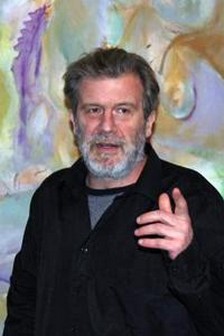
Vuk Kulenović (1946-2017, Serbia/USA) hailed by the Boston Globe as “one of the most important and interesting composers working in the area – or anywhere – today”, spent the last 20 years of his life living and working in Boston, MA, as Professor of Composition at the Berklee College of Music, upon leaving his native Yugoslavia. His music has been commissioned and widely performed by some of the most prominent orchestras in Europe, including the Concertgebouw Orchestra of Amsterdam, Stuttgart Radio Symphony Orchestra, Orchestre National de la Radiodiffusion Française, and the Slovenian Philharmonic Orchestra, as well as the philharmonic orchestras of Belgrade, Zagreb and Sarajevo. The works of Mr. Kulenovic have been performed winning critical acclaim in Europe, North America, Asia, and Australia, among others. His oeuvre includes seven symphonies, sixteen instrumental concerti, an Oratorio, a ballet, twelve film scores, over 30 pieces for chamber orchestra and numerous chamber and solo pieces. Mr. Kulenovic was chosen to write the opening cantata for the 1984 Winter Olympic Games in Sarajevo, the city in which he was born. He has received awards from the International Contemporary Music Bienalle in Venice, Radio France, BEMUS Festival, the Fulbright Foundation, and the Prešern award.
In relation to his work Mehanički Orfej (Mechanical Orpheus), which was premièred at the 1992 International Review of Composers, held that year in Sremski Karlovci and Novi Sad, the composer made the following note: “There is a Rilke poem where the god of distance says to Eurydice: ‘He turned around…’. A distracted Eurydice then asks: ‘Who?’. In this musical transformation of Rilke’s poem, Orpheus turns around several times, as if riding on a carrousel of memories”.
Among absurd symbols wherein we might still recognise ourselves today, there is Orpheus as well. In Kulenović’s work, he exists only in his identical compulsive actions, repeating a half-turn over the shoulder, which is repeated in the work’s “never-ending loop” without ever being completed. We get a glimpse of Eurydice as a neurotic and distracted creature with atrophied emotions. She is likewise “programmed” to repeat her heartless question, “Who?”, at regular intervals. The world of Mehanički Orfej is one ruled by powerful micro-entities, irrelevant details that monstrously outgrow the emotionality and invention of a free consciousness. They establish their dominion over life for the sake of a different, anti-human Pantheon.
“Love does not exist. The deities that populate Mount Olympus are mechanical freaks that fashion the world according to their own image. For them there is no forgiveness or return from the dead, because all life is deadened anyway. In such a world, it is natural that the atrophied remains of spirit feed on energy and not feelings. Like in the fairytale about the emperor of China and the nightingale: a mechanical bird always sings, eats nothing, and requires no love. And it is prettier, too.”
(Extract from Zorica Premate’s text about Mehanički Orfej, Novi zvuk, No. 1, 1992, pp. 165–168.)


